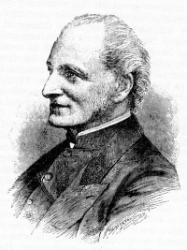Planning worship?
Check out our sister site, ZeteoSearch.org,
for 20+ additional resources related to your search.
- |
User Links
Person Results
Arthur Sullivan

1842 - 1900 Person Name: Arthur S. Sullivan Composer of "[Abide in Thee, in that deep love of thine]" in Sheng tu shi ge = Hymnary (聖徒詩歌) Arthur Seymour Sullivan (b Lambeth, London. England. 1842; d. Westminster, London, 1900) was born of an Italian mother and an Irish father who was an army bandmaster and a professor of music. Sullivan entered the Chapel Royal as a chorister in 1854. He was elected as the first Mendelssohn scholar in 1856, when he began his studies at the Royal Academy of Music in London. He also studied at the Leipzig Conservatory (1858-1861) and in 1866 was appointed professor of composition at the Royal Academy of Music. Early in his career Sullivan composed oratorios and music for some Shakespeare plays. However, he is best known for writing the music for lyrics by William S. Gilbert, which produced popular operettas such as H.M.S. Pinafore (1878), The Pirates of Penzance (1879), The Mikado (1884), and Yeomen of the Guard (1888). These operettas satirized the court and everyday life in Victorian times. Although he composed some anthems, in the area of church music Sullivan is best remembered for his hymn tunes, written between 1867 and 1874 and published in The Hymnary (1872) and Church Hymns (1874), both of which he edited. He contributed hymns to A Hymnal Chiefly from The Book of Praise (1867) and to the Presbyterian collection Psalms and Hymns for Divine Worship (1867). A complete collection of his hymns and arrangements was published posthumously as Hymn Tunes by Arthur Sullivan (1902). Sullivan steadfastly refused to grant permission to those who wished to make hymn tunes from the popular melodies in his operettas.
Bert Polman
Arthur Sullivan
J. Denham Smith

1817 - 1889 Author of "住在祢裏面 (Abide in Thee)" in Sheng tu shi ge = Hymnary (聖徒詩歌) Smith, Joseph Denham, was born at Romsey, Hants, circa 1816. After studying for some time in the Dublin Theological Institute, he entered the Congregational Ministry in 1840. In 1849 he became Pastor of the Congregational Church at Kingstown, near Dublin, and in 1863 began a series of services at Merrion Hall, Dublin, and subsequently at other places. His Evangelistic work in England and Ireland is well known. In connection therewith he has published a large number of tracts, pamphlets, and small books. One of these, Times of Refreshing illustrated in the Present Revival of Religion, 1860, included several of his hymns which were sung during that time at his special services at Kingstown. He also published Seven Hymns for the Present Time, circa 1870-6; and The New Times of Refreshing. Hymns for General and Special Use. Compiled by J. Denham Smith. London: J. E. Hawkins, n.d. In this collection his signed hymns are 36 in all, and deal with the subjects usually associated with what are known as "Gospel Hymns." There are several also in The Enlarged London Hymn Book, 1873. His hymn "Just as Thou art—how wondrous fair" (1860) is in Spurgeon's Our Own Hymn Book, 1866, and "Yes, we part, but not for ever "(Parting), in several minor collections. Mr. Smith's hymns have not been incorporated into the leading hymnals of Great Britain or America.
--John Julian, Dictionary of Hymnology (1907)
J. Denham Smith


 My Starred Hymns
My Starred Hymns


